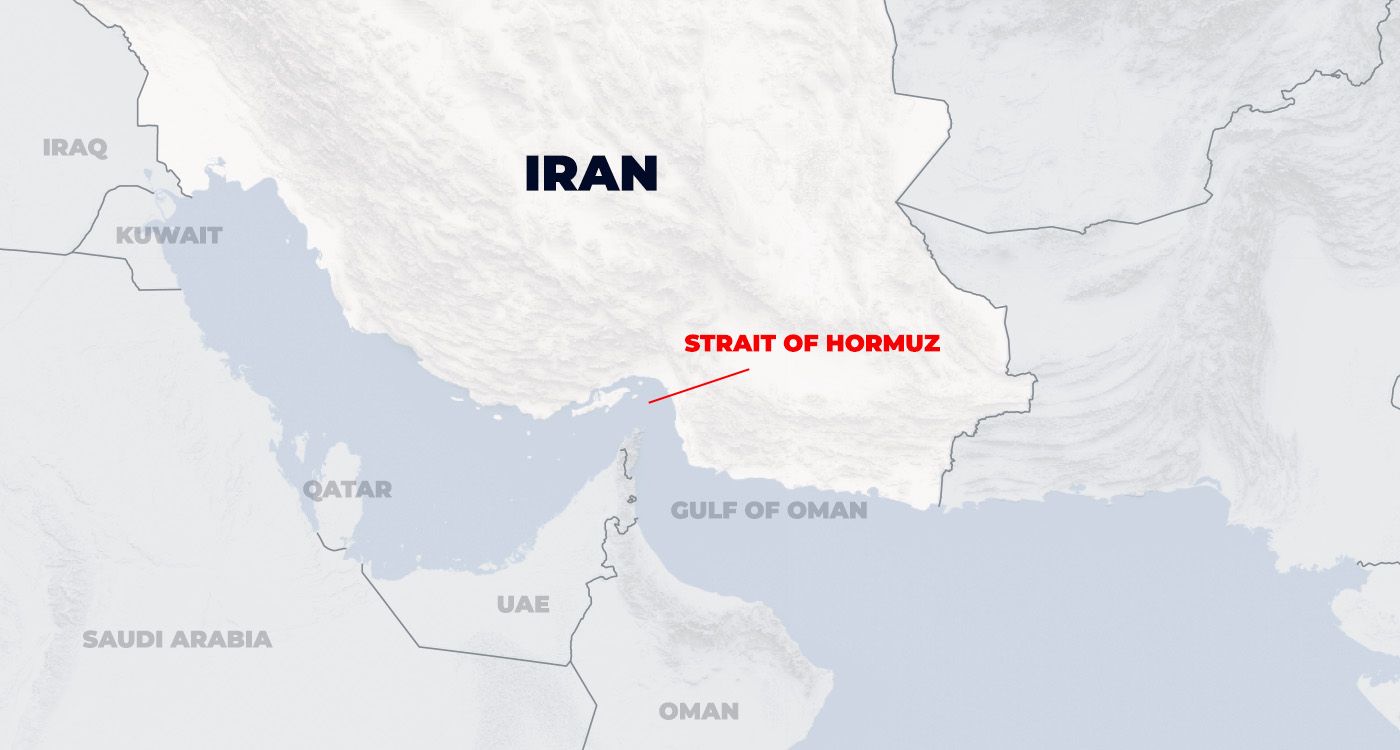- Home
- Middle East
- Strait of Hormuz Faces Potential Closure Amid Rising Regional Tensions

©This is Beirut
Iran’s parliament gave the green light to a proposal to shut down the Strait of Hormuz on Sunday, a step that needs clearance from the security authorities. Such a move could significantly disrupt worldwide oil shipments and heighten tensions in an already unstable region.
The Strait, which narrows to just 33 kilometers at its slimmest point, connects the Persian Gulf to the Gulf of Oman and the Arabian Sea. It serves as a crucial passageway for nearly 20% of the world’s daily oil and liquefied natural gas (LNG) shipments. Each day, around 17.8 to 20.8 million barrels of oil pass through it, representing over a quarter of all seaborne oil trade, along with about 20% of the global LNG supply.
Countries such as the Kingdom of Saudi Arabia, the Islamic Republic of Iran, the United Arab Emirates, Kuwait and Iraq rely heavily on this route to export their energy resources.
Saudi Arabia transports roughly 5.5 million barrels of oil daily through the strait, making up almost 38% of its total oil exports. Although pipeline routes that avoid the Strait of Hormuz exist, their combined capacity is only about 2.6 million barrels per day, which is not enough to compensate for a complete shutdown.
Asia’s energy stability is closely tied to the Strait of Hormuz. The region depends heavily on uninterrupted flows through the waterway, with around 35% of total energy import volumes transiting the Strait. For countries like Japan and South Korea, dependence is even more acute, nearing complete reliance. A closure would therefore send shockwaves through the region’s energy markets, potentially causing fuel shortages, inflation and broader economic instability.
China, as the world’s biggest importer of oil, is especially at risk. Approximately 45% of its total petroleum imports pass through the Strait of Hormuz, meaning that any disruption would have immediate and severe effects on the Chinese economy and its supply chains.
This decision by Tehran’s parliament comes in direct response to recent US airstrikes on Iranian nuclear facilities, marking a sharp escalation in the ongoing war between Iran and Israel. However, the ultimate authority to implement the closure rests with Iran’s Supreme National Security Council, meaning the proposal has not yet been enacted.
Shutting down the Strait of Hormuz would cause severe disruptions to global energy markets. Experts warn that oil prices could spike beyond $100 per barrel, and supply chains worldwide might face severe disruption.
While Israel does not rely heavily on oil from the Persian Gulf, it is not immune to the fallout of a Hormuz crisis. Inflation in global fuel costs, heightened maritime security concerns and strained shipping routes would all affect Israel indirectly. Approximately 40% to 60% of Israel’s crude oil is sourced from Azerbaijan, transported through the Baku–Tbilisi–Ceyhan pipeline to the Turkish port of Ceyhan, and then shipped by sea to Israel’s refineries in Haifa and Ashdod.
The US government has warned Tehran that attempting to block this vital passage would amount to “economic suicide,” citing Iran’s own heavy reliance on exporting oil through this corridor. US Secretary of State Marco Rubio publicly urged China to intervene and persuade Iran not to block the Strait of Hormuz.
Historically, Iran has threatened to close the Strait on several occasions but has never followed through. During the Iran–Iraq War (1980–1988), a period known as the “Tanker War,” both sides attacked more than 400 commercial vessels, yet the Strait remained operational. More recently, in April 2024, Iran’s Revolutionary Guard seized the MSC Aries near the Emirati port of Fujairah and guided it through the Strait, reinforcing Tehran’s maritime assertiveness.
Iran and Oman share control over the Strait and frequently attempt to assert influence either through military posturing or legal channels. Gulf states, particularly members of the Gulf Cooperation Council, have voiced strong objections to what they see as Iranian aggression in the waterway. Meanwhile, the United States regularly conducts Freedom of Navigation Operations (FONOPs) in the Strait, sending warships through to emphasize that it remains an international waterway, despite regional disputes.
To ensure maritime security in the Gulf, the US Fifth Fleet, based in Bahrain, remains a key player. It operates alongside multinational coalitions such as Combined Task Force 150 and the International Maritime Security Construct (CTF SENTINEL), which includes naval forces from the US, UK, France, Germany, Australia, Canada, Saudi Arabia, Bahrain and the UAE. These coalitions collaborate to deter threats and guarantee the free movement of vessels through the critical chokepoint.
Under international law, specifically Article 37 of the United Nations Convention on the Law of the Sea (UNCLOS), the Strait of Hormuz is classified as an international strait, guaranteeing the right of “transit passage” to both commercial and military vessels. Although Iran has signed but not ratified the UNCLOS agreement, and Oman has fully ratified it, the principle is regarded as customary international law and is thus legally enforceable. This means that, in principle, Iran cannot lawfully obstruct the movement of civilian maritime traffic through the Strait.
If Iran were to enforce a full closure, the global response would be swift. Military intervention, particularly by US forces, would be likely, aimed at reopening the passage and securing shipping lanes. On the diplomatic front, the European Union has already denounced the idea of a closure as “extremely dangerous,” while the United Nations Security Council could convene to discuss sanctions or legal measures. Individual countries may also pursue maritime law cases to challenge Iran’s actions.
While the energy sector would take the hardest hit, the Strait is also critical for other maritime trade, including dry bulk cargo and container shipments. Disruptions could send shipping prices soaring and inflict significant delays across global supply chains, affecting everything from industrial goods to consumer products.
Reactions among global powers vary. The EU strongly opposes any closure of the Strait, citing risks to market stability and regional peace. Russia, though silent on the current crisis, has previously taken stances supporting coastal states' control over narrow straits. India, in contrast, has responded calmly due to its diversified energy imports from Russia, the US and other suppliers, lessening its dependence on Gulf oil.
Read more



Comments